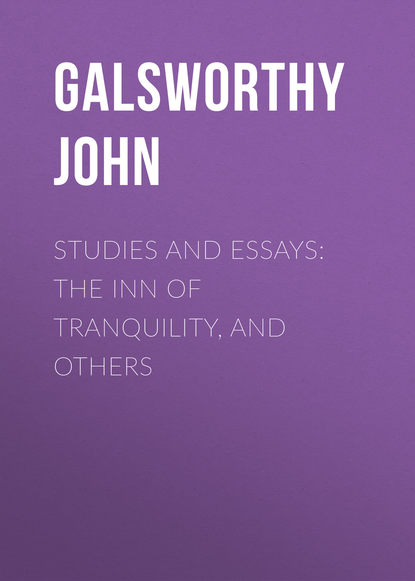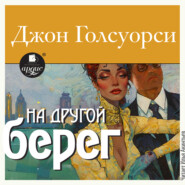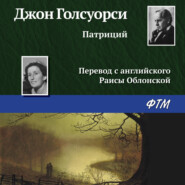По всем вопросам обращайтесь на: info@litportal.ru
(©) 2003-2024.
✖
Studies and Essays: The Inn of Tranquility, and Others
Настройки чтения
Размер шрифта
Высота строк
Поля
From early morning there had been bleating of sheep in the yard, so that one knew the creatures were being sheared, and toward evening I went along to see. Thirty or forty naked-looking ghosts of sheep were penned against the barn, and perhaps a dozen still inhabiting their coats. Into the wool of one of these bulky ewes the farmer's small, yellow-haired daughter was twisting her fist, hustling it toward Fate; though pulled almost off her feet by the frightened, stubborn creature, she never let go, till, with a despairing cough, the ewe had passed over the threshold and was fast in the hands of a shearer. At the far end of the barn, close by the doors, I stood a minute or two before shifting up to watch the shearing. Into that dim, beautiful home of age, with its great rafters and mellow stone archways, the June sunlight shone through loopholes and chinks, in thin glamour, powdering with its very strangeness the dark cathedraled air, where, high up, clung a fog of old grey cobwebs so thick as ever were the stalactites of a huge cave. At this end the scent of sheep and wool and men had not yet routed that home essence of the barn, like the savour of acorns and withering beech leaves.
They were shearing by hand this year, nine of them, counting the postman, who, though farm-bred, "did'n putt much to the shearin'," but had come to round the sheep up and give general aid.
Sitting on the creatures, or with a leg firmly crooked over their heads, each shearer, even the two boys, had an air of going at it in his own way. In their white canvas shearing suits they worked very steadily, almost in silence, as if drowsed by the "click-clip, click-clip" of the shears. And the sheep, but for an occasional wriggle of legs or head, lay quiet enough, having an inborn sense perhaps of the fitness of things, even when, once in a way, they lost more than wool; glad too, mayhap, to be rid of their matted vestments. From time to time the little damsel offered each shearer a jug and glass, but no man drank till he had finished his sheep; then he would get up, stretch his cramped muscles, drink deep, and almost instantly sit down again on a fresh beast. And always there was the buzz of flies swarming in the sunlight of the open doorway, the dry rustle of the pollarded lime-trees in the sharp wind outside, the bleating of some released ewe, upset at her own nakedness, the scrape and shuffle of heels and sheep's limbs on the floor, together with the "click-clip, click-clip" of the shears.
As each ewe, finished with, struggled up, helped by a friendly shove, and bolted out dazedly into the pen, I could not help wondering what was passing in her head – in the heads of all those unceremoniously treated creatures; and, moving nearer to the postman, I said:
"They're really very good, on the whole."
He looked at me, I thought, queerly.
"Yaas," he answered; "Mr. Molton's the best of them."
I looked askance at Mr. Molton; but, with his knee crooked round a young ewe, he was shearing calmly.
"Yes," I admitted, "he is certainly good."
"Yaas," replied the postman.
Edging back into the darkness, away from that uncomprehending youth, I escaped into the air, and passing the remains of last year's stacks under the tall, toppling elms, sat down in a field under the bank. It seemed to me that I had food for thought. In that little misunderstanding between me and the postman was all the essence of the difference between that state of civilisation in which sheep could prompt a sentiment, and that state in which sheep could not.
The heat from the dropping sun, not far now above the moorline, struck full into the ferns and long grass of the bank where I was sitting, and the midges rioted on me in this last warmth. The wind was barred out, so that one had the full sweetness of the clover, fast becoming hay, over which the swallows were wheeling and swooping after flies. And far up, as it were the crown of Nature's beautiful devouring circle, a buzzard hawk, almost stationary on the air, floated, intent on something pleasant below him. A number of little hens crept through the gate one by one, and came round me. It seemed to them that I was there to feed them; and they held their neat red or yellow heads to one side and the other, inquiring with their beady eyes, surprised at my stillness. They were pretty with their speckled feathers, and as it seemed to me, plump and young, so that I wondered how many of them would in time feed me. Finding, however, that I gave them nothing to eat, they went away, and there arose, in place of their clucking, the thin singing of air passing through some long tube. I knew it for the whining of my dog, who had nosed me out, but could not get through the padlocked gate. And as I lifted him over, I was glad the postman could not see me – for I felt that to lift a dog over a gate would be against the principles of one for whom the connection of sheep with good behaviour had been too strange a thought. And it suddenly rushed into my mind that the time would no doubt come when the conduct of apples, being plucked from the mother tree, would inspire us, and we should say: "They're really very good!" And I wondered, were those future watchers of apple-gathering farther from me than I, watching sheep-shearing, from the postman? I thought, too, of the pretty dreams being dreamt about the land, and of the people who dreamed them. And I looked at that land, covered with the sweet pinkish-green of the clover, and considered how much of it, through the medium of sheep, would find its way into me, to enable me to come out here and be eaten by midges, and speculate about things, and conceive the sentiment of how good the sheep were. And it all seemed queer. I thought, too, of a world entirely composed of people who could see the sheen rippling on that clover, and feel a sort of sweet elation at the scent of it, and I wondered how much clover would be sown then? Many things I thought of, sitting there, till the sun sank below the moor line, the wind died off the clover, and the midges slept. Here and there in the iris-coloured sky a star crept out; the soft-hooting owls awoke. But still I lingered, watching how, one after another, shapes and colours died into twilight; and I wondered what the postman thought of twilight, that inconvenient state, when things were neither dark nor light; and I wondered what the sheep were thinking this first night without their coats. Then, slinking along the hedge, noiseless, unheard by my sleeping spaniel, I saw a tawny dog stealing by. He passed without seeing us, licking his lean chops.
"Yes, friend," I thought, "you have been after something very unholy; you have been digging up buried lamb, or some desirable person of that kind!"
Sneaking past, in this sweet night, which stirred in one such sentiment, that ghoulish cur was like the omnivorousness of Nature. And it came to me, how wonderful and queer was a world which embraced within it, not only this red gloating dog, fresh from his feast on the decaying flesh of lamb, but all those hundreds of beings in whom the sight of a fly with one leg shortened produced a quiver of compassion. For in this savage, slinking shadow, I knew that I had beheld a manifestation of divinity no less than in the smile of the sky, each minute growing more starry. With what Harmony – I thought – can these two be enwrapped in this round world so fast that it cannot be moved! What secret, marvellous, all-pervading Principle can harmonise these things! And the old words 'good' and 'evil' seemed to me more than ever quaint.
It was almost dark, and the dew falling fast; I roused my spaniel to go in.
Over the high-walled yard, the barns, the moon-white porch, dusk had brushed its velvet. Through an open window came a roaring sound. Mr. Molton was singing "The Happy Warrior," to celebrate the finish of the shearing. The big doors into the garden, passed through, cut off the full sweetness of that song; for there the owls were already masters of night with their music.
On the dew-whitened grass of the lawn, we came on a little dark beast. My spaniel, liking its savour, stood with his nose at point; but, being called off, I could feel him obedient, still quivering, under my hand.
In the field, a wan huddle in the blackness, the dismantled sheep lay under a holly hedge. The wind had died; it was mist-warm. 1910
EVOLUTION
Coming out of the theatre, we found it utterly impossible to get a taxicab; and, though it was raining slightly, walked through Leicester Square in the hope of picking one up as it returned down Piccadilly. Numbers of hansoms and four-wheelers passed, or stood by the curb, hailing us feebly, or not even attempting to attract our attention, but every taxi seemed to have its load. At Piccadilly Circus, losing patience, we beckoned to a four-wheeler and resigned ourselves to a long, slow journey. A sou'-westerly air blew through the open windows, and there was in it the scent of change, that wet scent which visits even the hearts of towns and inspires the watcher of their myriad activities with thought of the restless Force that forever cries: "On, on!" But gradually the steady patter of the horse's hoofs, the rattling of the windows, the slow thudding of the wheels, pressed on us so drowsily that when, at last, we reached home we were more than half asleep. The fare was two shillings, and, standing in the lamplight to make sure the coin was a half-crown before handing it to the driver, we happened to look up. This cabman appeared to be a man of about sixty, with a long, thin face, whose chin and drooping grey moustaches seemed in permanent repose on the up-turned collar of his old blue overcoat. But the remarkable features of his face were the two furrows down his cheeks, so deep and hollow that it seemed as though that face were a collection of bones without coherent flesh, among which the eyes were sunk back so far that they had lost their lustre. He sat quite motionless, gazing at the tail of his horse. And, almost unconsciously, one added the rest of one's silver to that half-crown. He took the coins without speaking; but, as we were turning into the garden gate, we heard him say:
"Thank you; you've saved my life."
Not knowing, either of us, what to reply to such a curious speech, we closed the gate again and came back to the cab.
"Are things so very bad?"
"They are," replied the cabman. "It's done with – is this job. We're not wanted now." And, taking up his whip, he prepared to drive away.
"How long have they been as bad as this?"
The cabman dropped his hand again, as though glad to rest it, and answered incoherently:
"Thirty-five year I've been drivin' a cab."
And, sunk again in contemplation of his horse's tail, he could only be roused by many questions to express himself, having, as it seemed, no knowledge of the habit.
"I don't blame the taxis, I don't blame nobody. It's come on us, that's what it has. I left the wife this morning with nothing in the house. She was saying to me only yesterday: 'What have you brought home the last four months?' 'Put it at six shillings a week,' I said. 'No,' she said, 'seven.' Well, that's right – she enters it all down in her book."
"You are really going short of food?"
The cabman smiled; and that smile between those two deep hollows was surely as strange as ever shone on a human face.
"You may say that," he said. "Well, what does it amount to? Before I picked you up, I had one eighteen-penny fare to-day; and yesterday I took five shillings. And I've got seven bob a day to pay for the cab, and that's low, too. There's many and many a proprietor that's broke and gone – every bit as bad as us. They let us down as easy as ever they can; you can't get blood from a stone, can you?" Once again he smiled. "I'm sorry for them, too, and I'm sorry for the horses, though they come out best of the three of us, I do believe."
One of us muttered something about the Public.
The cabman turned his face and stared down through the darkness.
"The Public?" he said, and his voice had in it a faint surprise. "Well, they all want the taxis. It's natural. They get about faster in them, and time's money. I was seven hours before I picked you up. And then you was lookin' for a taxi. Them as take us because they can't get better, they're not in a good temper, as a rule. And there's a few old ladies that's frightened of the motors, but old ladies aren't never very free with their money – can't afford to be, the most of them, I expect."
"Everybody's sorry for you; one would have thought that – "
He interrupted quietly: "Sorrow don't buy bread.. I never had nobody ask me about things before." And, slowly moving his long face from side to side, he added: "Besides, what could people do? They can't be expected to support you; and if they started askin' you questions they'd feel it very awkward. They know that, I suspect. Of course, there's such a lot of us; the hansoms are pretty nigh as bad off as we are. Well, we're gettin' fewer every day, that's one thing."
Not knowing whether or no to manifest sympathy with this extinction, we approached the horse. It was a horse that "stood over" a good deal at the knee, and in the darkness seemed to have innumerable ribs. And suddenly one of us said: "Many people want to see nothing but taxis on the streets, if only for the sake of the horses."
The cabman nodded.
"This old fellow," he said, "never carried a deal of flesh. His grub don't put spirit into him nowadays; it's not up to much in quality, but he gets enough of it."
"And you don't?"
The cabman again took up his whip.
"I don't suppose," he said without emotion, "any one could ever find another job for me now. I've been at this too long. It'll be the workhouse, if it's not the other thing."
And hearing us mutter that it seemed cruel, he smiled for the third time.
"Yes," he said slowly, "it's a bit 'ard on us, because we've done nothing to deserve it. But things are like that, so far as I can see. One thing comes pushin' out another, and so you go on. I've thought about it – you get to thinkin' and worryin' about the rights o' things, sittin' up here all day. No, I don't see anything for it. It'll soon be the end of us now – can't last much longer. And I don't know that I'll be sorry to have done with it. It's pretty well broke my spirit."
"There was a fund got up."
"Yes, it helped a few of us to learn the motor-drivin'; but what's the good of that to me, at my time of life? Sixty, that's my age; I'm not the only one – there's hundreds like me. We're not fit for it, that's the fact; we haven't got the nerve now. It'd want a mint of money to help us. And what you say's the truth – people want to see the end of us. They want the taxis – our day's over. I'm not complaining; you asked me about it yourself."
And for the third time he raised his whip.
"Tell me what you would have done if you had been given your fare and just sixpence over?"
The cabman stared downward, as though puzzled by that question.

















